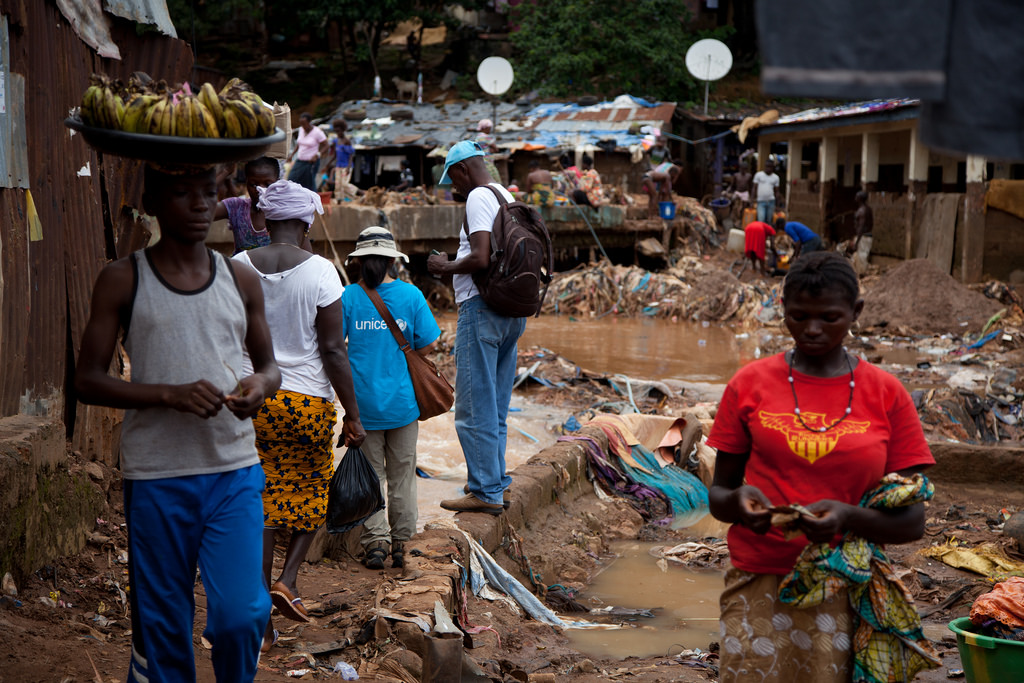By UNICEF staff Lang Ma, from Chengdu, China, currently working in UNICEF Sierra Leone Country Office as Education Specialist in Early Childhood Development (ECD)
Before the Chinese New Year in 2015, I moved to Freetown for my new position as the Education Specialist in ECD in UNICEF Sierra Leone, after working in UNICEF China as an Education Officer (ECD) for four and half years. This is my first time in Africa.
Sierra Leone is a developing country in West Africa, with deep poverty, prevalent illiteracy, and high maternal and infant death rates. It is also one of the three counties which were impacted by the Ebola epidemic that broke out in 2014. There were fewer new Ebola cases when I arrived, compared with the peak time.
The first challenges that I came across were the tough living conditions. Electricity was cut off on a daily basis, and sometimes water too. Once during the rainy season, one of my colleagues had to collect rain water to take a bath. Mosquitos are problematic, and several of my colleagues got infected by malaria and fell seriously ill. There is one type of malaria that is particularly malignant and potently deadly.
So, the most useful domestic appliance here is flashlight, and the most essential household items are mosquito net and repellent. Of course, one could definitely benefit from optimism in such an environment.
Work is full of challenges, from participating in emergency response, to assisting the Government design post-Ebola recovery plan, to supporting the Back to School campaign, to designing and implementing the ECD programme. Nevertheless, if you learn more about the contexts, you would better understand what we are doing here.
Sierra Leone experienced rebirth only 13 years ago, when the 11-year civil war ended. During the civil war, more than 70,000 people were killed or injured, and half of the population was displaced. People are slowly recovering from the nightmare, and several of the Sierra Leonean colleagues shared with me how they survived as refugees.
 |
|
©UNICEF Sierra Leone/2015/Kassaye |
With assistance of the UN and other international organizations, the country gradually came back on track. However, the Ebola epidemic struck it heavily. Take education for example, 1,800,000 school age children were out of school for a year, and nearly 9,000 children were orphaned. The schools were dilapidated and teaching-learning materials lost or severely damaged. Eventually, the Ebola epidemic was declared over in November 2015.
However, not all problems were solved. In the area of ECD, less than 1/6 of the children go to preschool, mostly those from the better off families. Preschool teachers are desperately lacking, and it is hard to find any decent toys or picture books in the preschools. Most poor families cannot afford to send their young ones to preschools, and the parents have hardly any knowledge about the importance of ECD or good parenting practices.
With support of the management and colleagues, I worked with the MEST (equivalent to MOE in China) counterparts and local ECD experts and designed the Community-based ECD project. It is expected that the first cohort of community-based ECD centres will be set up in the spring and equipped with the UNICEF ECD Kits. The young children in the poor communities will for the first time have access to quality toys such as building blocks, jigsaw puzzles, playdough, and crayons. They would be engaged in fun educational activities with trained community facilitators and develop their school readiness skills in playing. At the same time, 841 ECD Kits are being distributed to preschools across the country, benefiting more than 30,000 children.
Community mobilization activities for ECD will be carried out using popular methods such as local dramas and folk songs, to reach out to the community members, especially caregivers, with knowledge about the essentiality of ECD and good child rearing practices. I was talking with the local ECD experts the other day that we should write some children's songs, like “I wash my little hands” and “do not touch my body” to cultivate hygienic behaviours and empower children to protect themselves.
I was impressed with how the children and adults love wearing printed t-shirts here. It turned into a light bulb moment. Why not print key messages about ECD and good parenting practices in easy language on t-shirts? That is what we are going to do, and the t-shirts will become mobile and live billboards for ECD advocacy. And we are going to organize and train parents to make toys for young children, using local and recycled materials. It costs almost nothing and can effectively involve parents in early learning.
Moreover, we are developing the first set of Sierra Leonean picture books for young children under six years of age. Local writers and artists are going to tell the children's own stories in a culturally relevant manner. The stories include "a typical day of a baby girl", "animals on farm", "a market day", "Christian and Muslim holidays", and "I cannot wait to go to school". In addition to story time, drawing, singing, role-playing activities will be organized around the stories, and parents will also be involved.
My dear colleagues in the China office, particularly Xuefeng, my mentor, must have noticed this – what I am doing here in Sierra Leone was inspired by the experience working on the ECD programme in China. The goal is to plant the “seeds” of ECD knowledge and good ECD practices in the local culture and environment, use the ECD projects to leverage local ownership, policy improvements, and government investment, so that all of the 1,700,000 Sierra Leonean children aged 0-8 years old can have a faire staring point in their lives.
If that goal is reached, everything is worthwhile.





























